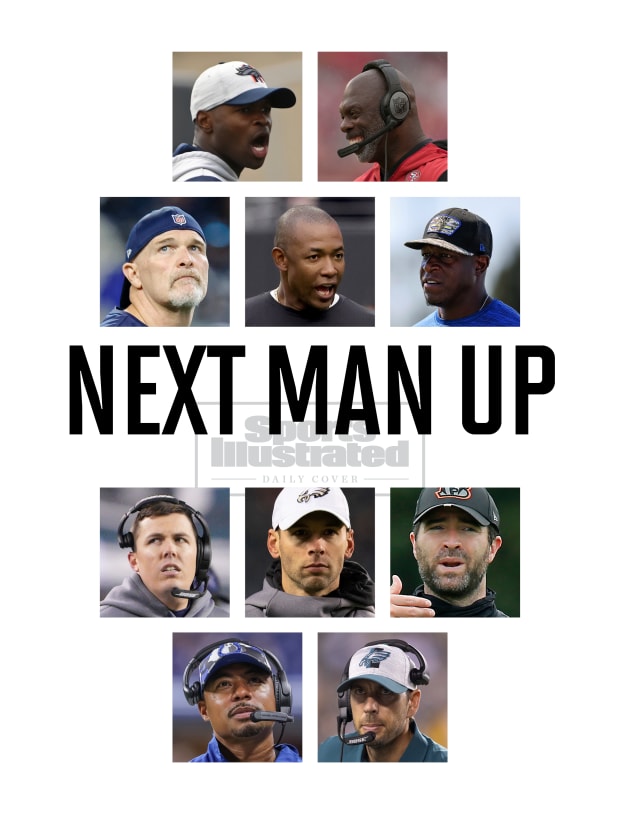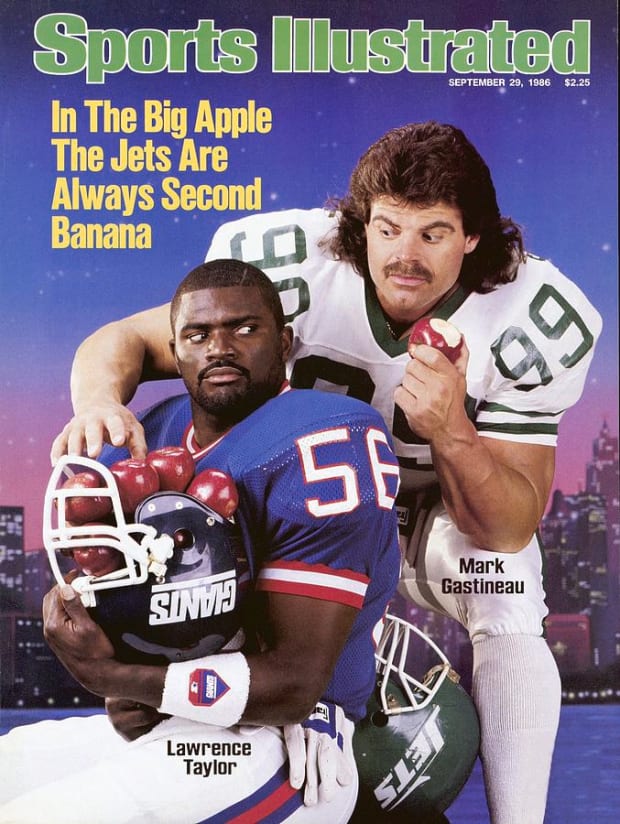Good morning, I’m Dan Gartland. I can’t wait to see what Aaron Judge does for an encore over the final seven games.
In today’s SI:AM:
👨⚖️ What to make of 61
🏈 The NFL’s future head coaches
If you're reading this on SI.com, you can sign up to get this free newsletter in your inbox each weekday at SI.com/newsletters.
Let’s not get carried away with 62
Well, he finally did it. Eight games after he tied Babe Ruth with his 60th home run of the season, Aaron Judge hit No. 61 in the seventh inning of last night’s contest against the Blue Jays to tie Roger Maris for the most home runs in an American League season. (You can watch the dinger and the aftermath here.)
Judge made us wait a while for the record-tying home run. He went 33 plate appearances between 60 and 61, compared to 11 plate appearances between Maris’s 60th and 61st. (Mark McGwire hit 60 and 61 in the same game.) The long wait only seemed to increase the hype around Judge’s pursuit of the record. He hit No. 60 last Tuesday. By Saturday, ESPN was breaking into college football action to show his at bats.
But why? When was the last time anybody paid this much attention to an AL or NL record? As baseball writer Joe Sheehan pointed out on Twitter this week, nobody cared about Hack Wilson’s NL record of 56 homers in a season when McGwire and Sammy Sosa had their record chase in 1998. There’s no way that Judge, with seven games left in the season, comes anywhere near Barry Bonds’s record of 73. So why all the attention?
The answer is obvious. ESPN and MLB Network won’t say it when interrupting coverage to show Judge at bat, but plenty of fans at home are thinking, He’s going to be the real record holder. Roger Maris Jr. said it in a press conference last night: “He should be revered for being the actual single-season home run champ. That’s really who he is, if he hits 62.”
But he’s not. Like it or not, Bonds is the record holder. So what are we to make of Judge’s season? Four of our writers weighed that question and came away with the same conclusion: Judge doesn’t have to be considered baseball’s real home run king to be admired for having one of the greatest seasons ever.
Here’s what Michael Rosenberg wrote:
There is a difference between comparing with past eras and competing with them. Comparing is fun. Competing is annoying. We can compare Judge’s dominance with Ruth’s or Barry Bonds’s, but we don’t need Judge to undo the feats (or misdeeds) of 1998 and 2001. This is a beautiful, messy sport with a long, beautiful, messy history. Sometimes, a great player has a special season. That is Aaron Judge in ’22. It doesn’t have to be more, or less, than that.
And Stephanie Apstein:
No. 61 has become an arbitrary marker. A better statistic by which to measure Judge’s greatness is 19: the number of home runs he has hit ahead of second place, the Phillies’ Kyle Schwarber, who has 42. No player has had such an immense lead over the rest of the league since Babe Ruth had 23 more than anyone else in 1928. That’s historic.
I’ve been invested in Judge’s record chase not because I’m ready to crown him baseball’s one true home run king but because he’s the best player on my favorite team having the sort of season you see only in video games. It’s absurd he is hitting for power so much better than all his colleagues (only 19 players in the majors have even half as many homers as Judge this year) while also competing for a triple crown. He’s a 6'7" center fielder who bats leadoff and has 16 stolen bases in 19 tries while also hitting more home runs than all but four men in history. You don’t have to compare him to Bonds to appreciate a remarkable combination of facts.
The best of Sports Illustrated

Today’s Daily Cover is Conor Orr’s annual list of NFL assistants who could be future head coaches.
Ross Dellenger is in Illinois, where the most powerful people in college football are meeting to discuss playoff expansion. … Albert Breer explains in his latest mailbag how quarterbacks on rookie contracts are creating parity in the NFL. … Ben Pickman tracks the WNBA offseason.
Around the sports world
Jets quarterback Zach Wilson has been cleared to start Sunday. … Another day, another damning report about Brett Favre’s alleged financial misdeeds. … We’ll see whether the story develops today, but as of yesterday NFL officials weren’t sure if they would move the Bucs-Chiefs game from Tampa to Minneapolis. … Nets coach Steve Nash says Kevin Durant’s summer trade request isn’t an issue for the team now. … Brian Hoyer will start for the Patriots if Mac Jones’s ankle holds him out. … Roger Federer gave his first interview since retiring last week.
The top five...
… things I saw yesterday:
5. Mike Trout’s 38th home run to move into second place on the AL leaderboard.
4. Aaron Judge’s mom, Patty, and Roger Maris Jr. hugging after Judge tied Maris.
3. The Brewers’ slick double play to get out of a bases-loaded jam.
2. Eduardo Escobar’s walk-off hit for the Mets.
1. The Blue Jays fans (one of whom is named Frankie Lasagna) who failed to catch Aaron Judge’s 61st home run ball.
SIQ
I’m doing two SIQs in a row about baseball from more than 100 years ago because I can’t believe this fact I just came across. On this day in 1914, which team clinched the National League pennant after being in last place July 18?
- Phillies
- Pirates
- Reds
- Braves
Yesterday’s SIQ: How long did it take to play the shortest nine-inning game in MLB history, between the Giants and Phillies on Sept. 28, 1919?
- 51 minutes
- One hour, 9 minutes
- One hour, 16 minutes
- One hour, 31 minutes
Answer: 51 minutes. It was the first game of a doubleheader on the final day of the season, and the two teams agreed ahead of time they were going to try to wrap things up as quickly as possible.
“That they shattered the mark and still made seven runs is remarkable,” the recap in the New York Daily News read. “The men went up intent on smacking the first pitch. They did for the most part and this led to the hasty finish.”
Not everyone swung at the first pitch, though. Giants leadoff hitter George Burns walked twice, and No. 2 hitter Ross Youngs worked the only other walk of the game. New York’s High Pockets Kelly and Philadelphia’s Gene Paulette and Lee Meadows (the pitcher) were the only strikeout victims.
The Giants won the game over the last-place Phillies, 6–1. New York picked up 13 hits, which seems pretty remarkable in a game that was played in well under an hour.
From the Vault: Sept. 30, 1986

Brian Lanker/Sports Illustrated
Unlike today, the mid 1980s were a good time to be a football fan in New York. The Giants and Jets haven’t made the playoffs in the same season since 2006, but in 1986, they were both coming off postseason appearances, and things seemed like they would only get better.
The Jets, who had snapped an 11-year playoff drought in 1981, had made the postseason in three of the previous five seasons. After a 2–1 start to the ’86 season—highlighted by a dramatic 51–45 overtime win over the Dolphins in Week 3—Paul Zimmerman wondered whether it was finally time for the Jets to overtake the Giants as New York’s team:
But for all their problems the Jets are exciting. Nevertheless, in spite of all that excitement, New York remains a Giant town. It’s a status that was earned through eight glorious years, 1956 through 1963, when the Giants won one championship and played in five more title games, dazzling the town with a superstar cast. Vince Lombardi ran the offense, Tom Landry the defense. The post-game locker room looked like Madison Avenue. Frank Gifford, Y.A. Tittle and Sam Huff all seemed to have a little crowd of personal-endorsement agents around them. In Times Square the huge face of Jim Patton blew smoke rings out of the Camel billboard. A ticket to a Giants game, once a throwaway item, became a sign of status.
The Jets, Zimmerman continued, were really only relevant when Joe Namath led them to the Super Bowl. Otherwise, they played second fiddle to the Giants. And that certainly didn’t change in 1986. The Jets lost in the second round of the playoffs. The Giants went 14–2 and won the Super Bowl.
Check out more of SI’s archives and historic images at vault.si.com.







